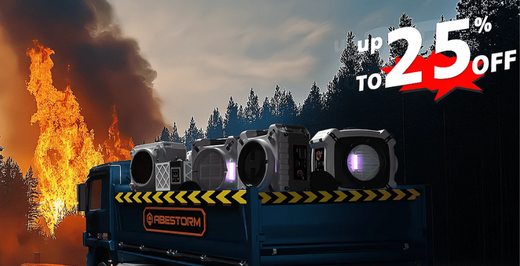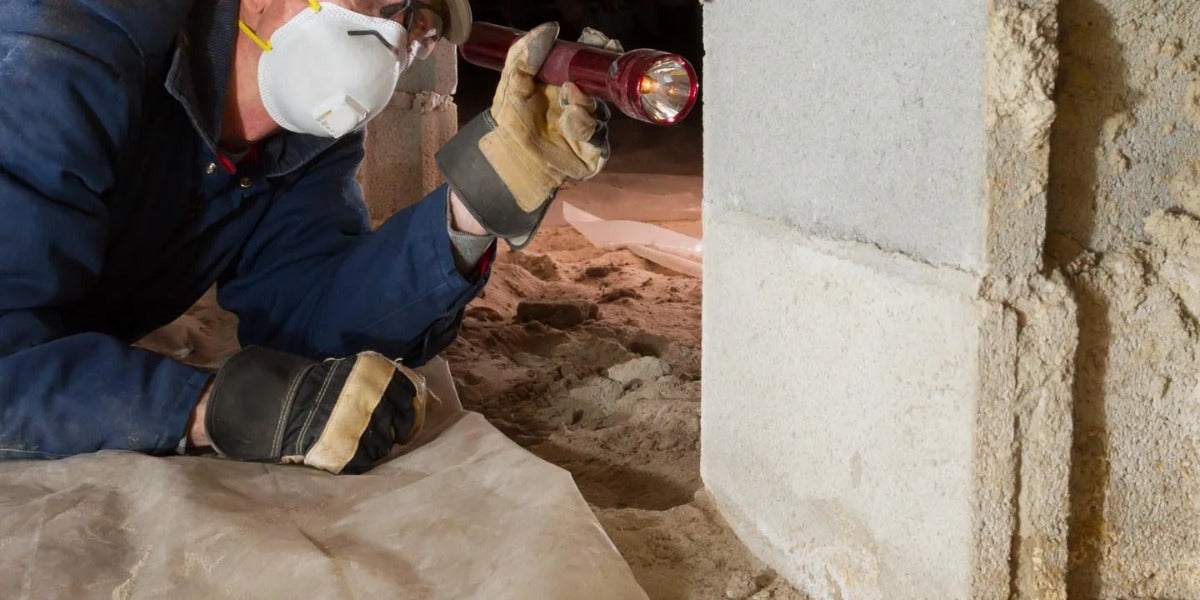You might panic if you look outside and see water leaking from your air conditioner. You must be wondering, is water dripping from an AC dangerous? Let's find out!
A leaking AC could be frustrating, but it's not harmful. That depends on whether the AC is leaking refrigerant or water. Although water leakage isn't dangerous, it can cause a lot of harm to your house. You can stop the leakage by getting yearly AC maintenance service, but that's a long-term solution. If you're looking for a short-term and quick solution, then Abestorm crawl space dehumidifiers are your best option. The guide below shows that water leaking from air conditioners is dangerous.
Top Major Causes Of Water Leaks
Clogged Air Filter:
A clogged air filter blocks air from flowing across the evaporator coil, the part of the AC that takes heat out of the air. This stops the coil from soaking up moisture as well as it should, causing condensation on its surface like tiny beads of water. As the coil warms up, the condensation drips off and fills up the drain pan designed to collect it.
If the pan gets too full, the water leaks from the unit.
Regularly cleaning or replacing your air filter with your AC according to the instructions helps prevent this problem. Check your air filter every two weeks during the hottest parts of summer and clean or replace it as needed. A clean air filter helps prevent leaks and keeps your AC unit running at its best.
Clogged Condensate Drain Line:
The condensate drain line carries away the water collected from the evaporator coil. If this line gets clogged with mold, algae, or dirt, the water backs up into the drain pan and overflows, leaking out of the unit. You can usually clean the condensate drain line by flushing it with clean water or using a pipe cleaner. A qualified technician can help if you're uncomfortable doing this yourself. Regularly flushing the condensate drain line with clean water can help prevent clogs and leaks. Look for your AC unit's manual for specific cleaning instructions for your model.
Full Drain Pan:
The drain pan collects the condensation that drips from the evaporator coil. If the drain pan fills up due to a clogged drain line, blocked airflow caused by a dirty air filter, or a broken drain pump, the water will overflow and leak out of the unit.
Regularly checking the drain pan, especially during times with a lot of humidity, and ensuring it's not overflowing helps prevent leaks. You can usually find the drain pan near the indoor unit of your AC system. Look for signs of overflow or mold growing around the pan, which could mean a drainage problem.
Malfunctioning Drain Pump:
Some AC units, particularly those located below ground level or in basements, use a drain pump to remove condensate. If the drain pump stops working right, it won't be able to pump the water out of the drain pan, causing it to overflow and leak. A qualified technician can diagnose and fix or replace a malfunctioning drain pump. If your AC unit is in a basement or crawlspace, be extra careful about checking for leaks, as these areas are more likely to get water damage.
Low Refrigerant Levels:
Refrigerant is a liquid that absorbs heat from the air inside your home. Low refrigerant levels can cause the evaporator coil to get too cold, leading to excessive condensation on its surface. This condensate can overflow the drain pan and leak out of the unit.
Proper refrigerant levels are essential for the AC to work well and prevent leaks. A qualified technician can check and refill your refrigerant if necessary. Schedule regular maintenance checkups for your AC unit to ensure the refrigerant levels are correct and prevent leaks before they start.
Damaged Drain Pan:
The drain pan, for instance, can develop cracks or even break since it is susceptible to wear and extreme temperatures. A damaged drain pan will not have the capacity to hold the condensate, leading to leaks. Damage or cracks in the drain pan should be replaced immediately to avoid leaks and water damage issues. When performing routine inspections, pay particular attention to the structural condition of the drain pan.
Incorrect AC Installation:
If your AC unit is not installed well, it can cause water leaks. For instance, the drain line could be situated at an angle that does not allow for proper draining, or the unit could be uneven, accumulating water and spilling over. The best way to avoid such problems is to ensure a professional technician installs your AC unit. In most cases, it is always advisable to hire the services of a licensed and certified technician when installing a new AC unit to avoid leakage in the future.
Frozen Coil:
It can become freezing and icy in humid conditions; the evaporator coil can freeze over. When the ice melts, excess water may overflow the drain pan and leak from the unit. This is especially true if the air filter is dirty or the airflow has been limited somehow.
To prevent the coils from freezing, one should clean the air filter and ensure no obstruction around the unit. The air filter should be cleaned often, and any shrubs or fences near the outdoor unit should be trimmed, as they can lower airflow across the coils, leading to freezing and resulting in leaks.
What Are The Consequences Of Water Dripping From Your AC?
Less Cooling Power:
You might wonder if water leaking from an air conditioner is dangerous. While it's not dangerous, it can affect the cooling power. A well-functioning AC unit removes moisture from the air as it cools it down. When water leaks from your AC unit, the system isn’t removing moisture as well as it should. This can make the air in your home feel damp and clammy because there is more moisture.
It is also important to note that a clogged drain line or a broken drain pump can lead to ice formation on the evaporator coil. This causes an insulating layer of ice on the coil, reducing the surface area available for absorbing heat from the air and making your AC unit work much harder to cool your home. When working harder, it uses more electricity, leading to high electricity bills.
Mold and Mildew Growth:
Water leakage from the AC units provides a suitable environment for mold and mildew. Mold spores are microscopic and can be carried by air; related issues include breathing difficulties, allergies, and other complications. Mold can also affect your furniture and goods. If mold appears on your AC or any other place in your house, you should immediately repair the leakage and contact a specialist for mold removal.
Damage to Your Property:
Any continuous leak from your AC unit threatens your walls, ceilings, and floors. The water can even discolor the drywall and, in the long run, affect the wood, leading to rotting and compromising the home's structure. If your AC unit is installed on the ceiling or in the attic, the leakage can result in water dripping down and soiling the insulation of your roof. Damaged insulation makes your roof less effective in cooling your home, making it easier for your energy bills to be high. The best way to avoid a costly repair or replacement bill is to attend to any leaks as soon as you notice them.
Electrical Problems:
The water source can affect the AC unit's electrical components and cause it to break down, which is a safety concern. Whenever water comes in contact with electrical wiring, it leads to a short circuit or even a fire outbreak. Any signs of water leakage around the electrical parts of the AC equipment should be stopped immediately and unplugged from the power source. You should also seek a professional technician's services to inspect and repair the unit if needed.
Shorter AC Lifespan:
It strains if your AC unit has to work harder all the time because of clogged drains, low refrigerant levels, or other problems that cause leaks. This can shorten the unit's lifespan and cause it to break down sooner than expected. Regular maintenance, including cleaning the air filter and drain line and fixing leaks promptly, can help your AC unit last longer and save you money on replacing it.
How Can A Dehumidifier Help With Drying Functions?
A dehumidifier can sometimes help with water leaking from your AC unit, but only in certain situations. Dehumidifiers are machines that take moisture out of the air. If your AC is leaking because there's too much moisture in the air and the drain can't handle it all, a dehumidifier can help by sucking out extra moisture. This might help prevent condensation from overflowing the drain pan and leaking out of the unit.
Get The Top-notch Abestorm Crawl Space Dehumidifiers To Help With Water Leakage
Is water dripping from your AC dangerous? Don't worry—we have a solution. At Abestorm, we know crawl spaces can get damp, leading to leaks from your AC unit. That's why we make top-rated Abestorm crawl space dehumidifiers. These machines remove moisture from the air, drying your crawl space and making it healthier.
This helps prevent condensation on your AC unit from dripping and causing leaks. Our dehumidifiers are easy to set up and care for and come in different sizes to fit any crawl space. If you're worried about AC leaks or want to improve your crawl space air, check out our crawl space dehumidifiers.
Meta Description:
Is water dripping from the AC dangerous? Let's find out the answer, discover the causes of AC leaks, and learn how crawl space dehumidifiers can help prevent them.









Shop For Dehumidifier